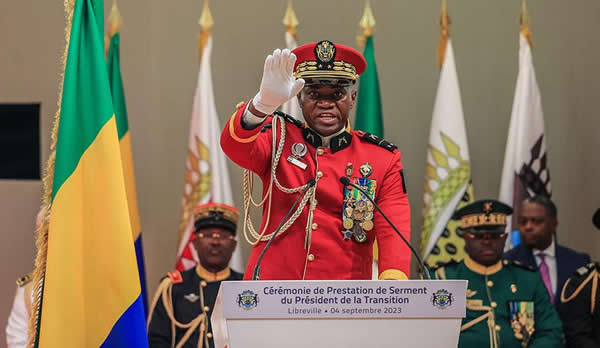
Thousands of people are gathering in Libreville and Akanda for what the government calls an Inclusive National Dialogue, to be held April 2 to 30, aimed at bringing Gabon back to civilian rule.
Military ruler General Brice Clotaire Oligui Nguema previously said he would hand back power in August 2025.
Nguema reportedly named 28 military officials, clerics, traditional rulers, and civil society and opposition leaders to serve as officials of the dialogue. Jean-Patrick Iba-Iba, head of the Roman Catholic Archdiocese of Libreville, will preside over the deliberations.
Gabon’s state TV says the participants will include opposition and civil society members. But Gabon’s opposition parties say a majority of the approximately 600 delegates are supporters of Nguema, and want him to stay in power.
They also say many of the civilians traveling to Libreville and Akanda were hired by military rulers to give a false impression that Nguema is popular. The government has refuted that claim.
Judicael Obiang Meyong, head of the opposition group the Movement to Act for Gabon’s Freedom and Independence, said it is surprising that Gabon’s military leaders are inviting many of the same officials, leaders and clerics who took part in previous dialogues that failed to solve the country’s problems.
He said those dialogues were organized to extend the rule of Gabon’s first president, Omar Bongo Ondimba, and when Omar Bongo died on June 8, 2009, a series of other dialogues attended by Bongo’s collaborators was organized to extend the Bongo family rule.
The Bongo family ruled Gabon for more than half a century. Nguema is a cousin of President Ali Bongo, who was overthrown by the military in August of last year.
Meyong said military rulers should have asked civilians, whose opinions were not taken into consideration by former regimes, to meet in each of Gabon’s nine provinces, outline their needs, and elect people to represent the provinces.
But Gabon’s government says more than 50,000 suggestions were received when Nguema asked civilians to give proposals on issues to be discussed during the one-month dialogue.
Francis Edgar Simar Mba, a political science lecturer at the Libreville-headquartered Omar Bongo University, said the dialogue is, so far, the most representative in Gabon’s history.
For the first time, he said, citizens of the central African state who are in exile and political refugees and their peers in the diaspora will be taking part in the national dialogue. In addition, Mba said, all civil society groups and Gabon’s 104 political parties will each send a representative to the dialogue, unlike in the past when only opposition and civil society close to the ruling government were invited to talk.
Nguema said he will respect decisions made at next month’s dialogue.
A March 10 decree signed by Nguema says the dialogue will pave the way for the drawing up of a new constitution, determine the duration of the transition, and propose the political, economic, and social organization of the central African nation after the transitional period.
Opposition and civil society groups say Gabon’s transitional government should respect an initial plan it published to hand power to civilian rule. According to that plan, the transition is to last 24 months, ending in August 2025 with free, credible, and fair elections.
Source: voanews.com























